|
|
|
Sort Order |
|
|
|
Items / Page
|
|
|
|
|
|
|
| Srl | Item |
| 1 |
ID:
152024
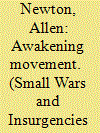

|
|
|
|
|
| Summary/Abstract |
This essay analyzes the link between mobilization and tribalism that developed in the Anbar Awakening. The Anbar Awakening exposed the Anbari tribal structure as a deeply entrenched and complex network deployed to mobilize support and generate behavior that would achieve the most advantageous strategy and position in a fight against al-Qaeda. Although this description supports David Kilcullen’s tribal society model, the rules of the Awakening movement that restored the tribal network were hardly explored by counter-insurgents for value and opportunity. The essay therefore draws on narratives from Anbari sheikhs to analyze the properties of tribalism (culture, identity, and problem-solving) as a non-linear social network, and demonstrates a paradigm in which mobilization of Anbari tribesmen is a valid indicator of security. The link between mobilization and tribalism in the Anbar Awakening therefore strategically develops to intervene in social life and address security locally.
|
|
|
|
|
|
|
|
|
|
|
|
|
|
|
|
| 2 |
ID:
152027
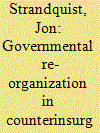

|
|
|
|
|
| Summary/Abstract |
Foreign policy program transfer, the shifting of implementation responsibility for a foreign policy program from one organization to another, is a ubiquitous, yet under-studied, counterinsurgency phenomenon. This article conceptually develops program transfer as an important object of study; analyzes, using archival sources, an empirical case of program transfer, Operation Switchback, drawn from US counterinsurgency practice in South Vietnam; and formulates two preliminary theoretical claims related to program transfer: (1) transferred programs will tend to be altered in accordance with the characteristics of the gaining organization, and (2) program transfer may act as a signal or early-warning indicator of foreign policy change.
|
|
|
|
|
|
|
|
|
|
|
|
|
|
|
|
| 3 |
ID:
152029
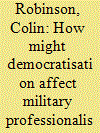

|
|
|
|
|
| Summary/Abstract |
The search continues for methods to improve security for development in Sub-Saharan Africa. One of the important actors in this security arena is Sub-Saharan African governments’ armies. Much of their capability to meet security challenge depends on how militarily professional they are. The wave of democratic evolution in Africa since 1990 also affected military professionalism. This article reviews three models for assessing how democratisation might affect military professionalism in Sub-Saharan Africa, with special attention to post-conflict states. This should make it possible to decide which analytical methods are most appropriate to measure military professionalism in the particular circumstances of Sub-Saharan African post-conflict democratisation. Depending upon the particular nation-state in question, this decision on analytical methods may be useful for other Sub-Saharan states as well.
|
|
|
|
|
|
|
|
|
|
|
|
|
|
|
|
| 4 |
ID:
152025
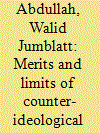

|
|
|
|
|
| Summary/Abstract |
Counter-ideological work is touted as crucial in combating terrorism. This article attempts to analyse the role of counter-ideology in dealing with a particular type of terrorism: Muslim jihadist extremism. This paper reiterates findings from existing research, in arguing that counter-ideology is indispensable for three reasons: firstly, to prevent Muslims from genuinely believing that terrorism is sanctioned by the faith; secondly, it is instructive to assure non-Muslims that Islam per se, is not the problem; and finally, it can be used to ‘rehabilitate’ terrorists who are in detention. However, this paper also suggests four criticisms of many counter-ideological efforts, and posit that in order for such work to be truly effective, the following shortcomings need to be rectified: firstly, the creation of unnecessary frontiers that may alienate potential allies; secondly, the inability to ‘preach to the right crowd’; thirdly, the perils of promoting ‘moderate’ and ‘progressive’ Islam; and finally, credibility issues associated with the people spearheading such works. An underlying factor that lurks in the background of all of these is the role of the ulama, or Islamic religious scholars. This article further hopes to contribute to the literature on counter-terrorism by exercising more scrutiny on the role of the ulama.
|
|
|
|
|
|
|
|
|
|
|
|
|
|
|
|
| 5 |
ID:
152028


|
|
|
|
|
| Summary/Abstract |
The utility of naval gunfire support (NGS) during the Malayan Emergency has been the subject of significant scrutiny. While the limitations of NGS were demonstrated in Malaya, it also has proven to be extremely useful under certain circumstances. The circumstances in which NGS has proven effective during earlier and later insurgencies have generally reflected those of the Malayan Emergency. Recent operations in Afghanistan and Iraq have been less conducive to the application of maritime power, but they did not denote the end of the naval role or the potential usefulness of NGS in counterinsurgency operations. NGS is an unheralded capability, but, aside from the historical significance, it remains relevant in the contemporary era under the right conditions.
|
|
|
|
|
|
|
|
|
|
|
|
|
|
|
|
| 6 |
ID:
152026
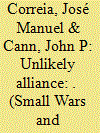

|
|
|
|
|
| Summary/Abstract |
The war that Portugal was obliged to fight in Africa began in 1961 and immediately stretched the resources of its armed forces. Nowhere was this thinness more apparent than in policing the vast territory of Angola. The east and southeast of Angola were particularly vulnerable, as the area was a vast, sparsely populated region characterised by enormous featureless plains or chanas covered in tall grass and broken by an extensive river system and mountainous forests. The only military solution to policing these immense spaces was aviation and specifically the helicopter that could carry troops into battle, protect them with a gunship and bring them home when the operation was concluded. The immediate problem for the Portuguese Air Force (Força Aérea Portuguesa or FAP) in Angola and elsewhere was a scarcity of helicopters. The solution was an alliance with South Africa, which had a strong inventory of Alouette IIIs, to help in policing the east. This move was likewise in the interest of South Africa, as its threat came from Zambia through south-eastern Angola. This article examines the strategic and tactical development of this unusual, cross-cultural alliance and the symbiotic relationship that resulted in destruction of the enemies of both in Angola.
|
|
|
|
|
|
|
|
|
|
|
|
|
|
|
|
|
|
|
|
|